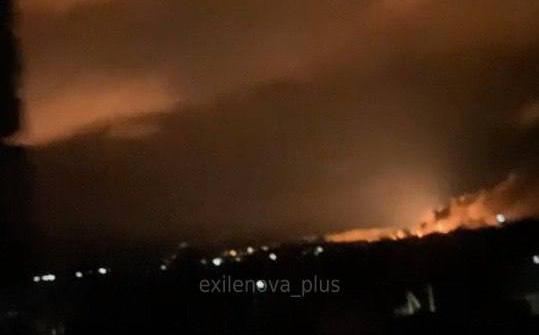
Explosions Rock Oil and Chemical Sites as Drone Wave Hits Russia
Drones attacked multiple targets across Russia early Wednesday, Oct. 29, igniting an oil depot in the Ulyanovsk region and causing temporary disruptions at airports from Moscow to the North Caucasus.
Russian Telegram channels reported that on the evening of Oct. 28, residents near Moscow complained about drones flying toward the capital.
JOIN US ON TELEGRAM
Follow our coverage of the war on the @Kyivpost_official.
As a precaution, operations at Moscow’s Domodedovo and Zhukovsky airports were briefly suspended but later resumed.
Monitoring channels claimed that around 100 to 130 drones were observed over Russian territory late Tuesday. Early Wednesday morning, additional airspace restrictions were introduced at airports in Vladikavkaz, Grozny, and Samara.
At around 12.20 a.m. local time, explosions were reported near Novospasskoye in the Ulyanovsk region, followed by videos showing a large fire at an oil depot.
Russian Telegram channels suggested that the facility belonged to NS-Oil OJSC.
In the Stavropol Territory, drones reportedly attacked Stavrolen LLC, a major petrochemical producer of polyethylene, benzene, and other chemicals.
Later, around 2 a.m., Russian media said drones hit the Mari Oil Refinery in the Republic of Mari El, with footage showing bright flashes in the sky.
According to Russia’s Ministry of Defense, 100 Ukrainian fixed-wing drones were shot down overnight:
Other Topics of Interest
Europe ‘Already in State of War,’ Poles Warn as Russian Attacks Intensify
Warsaw security experts cite balloon incursions, border manipulation, and information aggression as evidence the conflict has escalated far beyond Ukraine’s borders.
- 46 over the Bryansk region,
- 12 over the Kaluga region,
- 8 over the Belgorod region,
- 7 over the Krasnodar region,
- 6 each over the Moscow region (four of them headed for Moscow) and over the Oryol region,
- 4 over theUlyanovsk region,
- 3 each over occupied Crimea and the Mari El region,
- 2 over the Stavropol region, and
- 1 each over the Kursk, Smolensk, and Tula regions.
The Ukrainian military has not commented on the reported attacks.
Ukraine’s strikes on oil refining facilities deep inside Russia have dealt a major blow to Moscow’s economy, President Volodymyr Zelensky said on Oct. 27.
“We believe the Russians have lost more than 20% of their oil refining capacity, about 22-27% of their fuel. That’s why there are queues – there’s a real problem there,” Zelensky told journalists.
He said several Russian refineries were damaged by Ukrainian attacks, forcing Moscow to redistribute production among other plants.
The president noted that 90–95% of deep-strike operations inside Russia now use Ukrainian-made systems, with only a few launched using British Storm Shadow or French SCALP missiles.
“This is their money for the war – from oil refining. That’s why we’re working on it,” he added.
The Institute for the Study of War (ISW) previously reported that Ukraine’s refinery strikes have sharply driven up fuel prices in Russia, affecting more than 70% of the population.
Since August, Ukraine has intensified drone attacks on Russian oil and gas infrastructure, forcing shutdowns at about 38% of refineries by early October. The disruptions have caused widespread fuel shortages, prompting Moscow to limit gasoline and diesel sales and import supplies from Belarus, China, and other Asian countries.
Rosstat reported that fuel prices jumped 2.6% in September – the steepest monthly rise since 2018 – with annual inflation at 12.7%, the highest in 14 years.
This news story might be updated as more information becomes available.
First Appeared on
Source link






